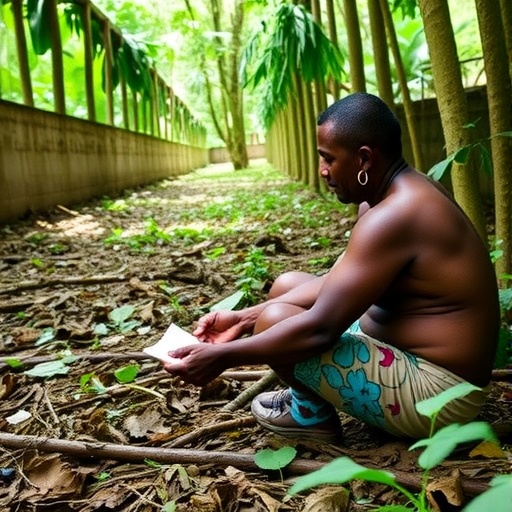In the dense and biodiverse Amazon rainforest, a pioneering scientific collaboration is reshaping how microbiome research is conducted with Indigenous communities. This initiative, rooted in a 15-year partnership with the Matsés people who inhabit regions along the Peru-Brazil border, highlights the critical importance of building research relationships grounded in trust, respect, and mutual benefit. As microbiome research increasingly seeks insights into human health and evolutionary biology, scientists argue that ethical engagement with Indigenous groups is not only a moral imperative but also a scientific necessity.
The Matsés partnership exemplifies a model where Indigenous knowledge and autonomy are integral throughout the scientific inquiry process. Rather than adopting a top-down research approach, the team—comprising microbiologists, physicians, and anthropologists—committed to co-developing research methods collaboratively with community leaders and members. Such collaboration ensured that the cultural context and societal values of the Matsés were embedded at every stage, from data collection to dissemination, thus fostering an environment of transparency and trust.
This framework addresses long-standing disparities often observed in scientific research involving Indigenous populations, where historical exploitation and structural inequalities have bred deep skepticism. The researchers emphasize that trust cannot be superficial or transactional; it demands sustained efforts to recognize past injustices and recalibrate conventional scientific practices. Through ongoing dialogues with Matsés leadership, including the acknowledgement of the authority of the Apu—the Matsés chief—they established legitimacy and respectful engagement that honored the community’s governance structures.
One of the more profound pivots in methodology was adapting traditional individual interview protocols to suit collective decision-making customs of the Matsés. Instead of solitary interviews, researchers employed “mini assemblies,” group discussions that encouraged communal reflection and consensus-building. This culturally consonant practice not only yielded richer ethnographic and microbiological insights but also reinforced social cohesion, a vital component for ethical research stewardship.
Concerns about bioethics and equitable benefit sharing were front and center in this collaboration. The Matsés voiced distrust regarding the potential commercialization of their biological samples, a fear rooted in global patterns of biopiracy. Responding to this, the research team codified benefit-sharing arrangements that guarantee any commercial profits derived from microbial strains linked to the Matsés would be equitably divided. This provision institutionalizes accountability, embedding long-term protections that transcend the typical lifespan of research projects and personnel shifts.
Moreover, the partnership entailed delivering direct health benefits to the community. Recognizing endemic health challenges such as intestinal parasitic infections, the researchers facilitated community-wide medical screenings regardless of individual study participation. These screenings demonstrated a tangible commitment to the well-being of the Matsés beyond purely academic outcomes, reflecting a genuinely reciprocal relationship between science and society.
Scientifically, this collaboration delves into the human gut microbiome’s evolutionary history, probing how access to processed foods and pharmaceuticals influences microbiota composition and function. The data gleaned from the Matsés—who maintain a traditional lifestyle with minimal industrial influence—serves as a valuable baseline against which global microbiome shifts can be understood. This knowledge has broad implications not only for evolutionary biology but also for contemporary public health strategies targeting microbiome resilience and diversity.
The researchers posit that the ethical integration of Indigenous perspectives offers scientific advancements with universal relevance. They caution that neglecting such frameworks risks perpetuating epistemic injustice and compromising data validity. Transparent co-governance and respect for Indigenous autonomy are essential in unlocking knowledge that respects both human dignity and intellectual sovereignty.
This groundbreaking approach signals a paradigm shift in microbiome research ethics. It foregrounds intersectionality between social sciences and life sciences, recognizing that microbiology does not exist in a vacuum but is deeply entangled with cultural, historical, and ethical dimensions. By translating principles of justice and equity into practical research methods, the team charts a course for future studies involving Indigenous populations and other marginalized groups worldwide.
In a global scientific environment increasingly attentive to decolonizing methodologies, the Matsés collaboration embodies how sustained, honest engagement and culturally aware scientific practices can foster innovative research programs that serve all stakeholders. The research underscores that genuine partnerships require humility, adaptability, and a foundational respect for Indigenous knowledge systems, ultimately enriching science itself.
This innovative model also signifies the responsibility of funding bodies and academic institutions to support frameworks that prioritize community engagement and ethical stewardship. The backing from entities such as the National Institutes of Health and the Fonds Wetenschappelijk Onderzoek – Vlaanderen reflects growing institutional acknowledgment of the importance of these approaches.
As microbiome science propels into new frontiers, integrating comprehensive ethical frameworks and Indigenous collaboration sets the stage for a more just, inclusive, and scientifically rigorous future. The Matsés researchers’ experience serves as a compelling testament that trust-building and mutual respect are not peripheral concerns but central pillars upon which groundbreaking science can thrive.
Subject of Research: People
Article Title: Navigating trust and science: Microbiome research in the Amazon
News Publication Date: 8-Oct-2025
Web References: http://dx.doi.org/10.1016/j.tim.2025.08.007
References: Tito et al., Trends in Microbiology
Image Credits: Raul Tito
Keywords: Indigenous peoples, Microbiology, Research ethics, Patients rights




